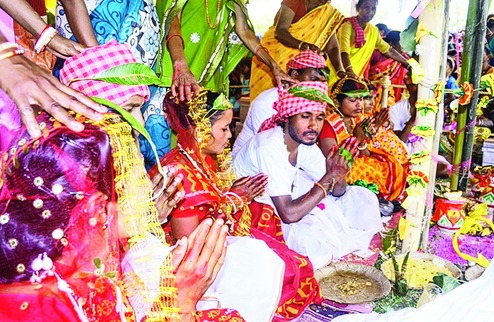
Cuttack: A PIL filed in Orissa High Court has sought its intervention against government inaction in implementing the Orissa Guest Control Order, 1968.
The Orissa Guest Control Order, 1968, sought to eradicate lavish expenditure in weddings and other social events.
Social activist Irishree Rout filed the PIL and regretted that despite notifying the order, the state government had neither taken any measures to implement it nor did it undertake awareness campaigns about its provisions.
The petition said the order aimed to reduce food wastage and control extravagance of some moneyed people at weddings and other social events.
"The government should designate officers to implement the order and opt for an awareness campaign and the people at the helm of affairs should set the example, so that the common people may not indulge in extravagance and save food which can be utilised for welfare of the society," the PIL states.
"The petition was filed on March 6. It has not been listed for hearing so far," petitioner counsel Khirod Rout said.
The petition has sought the court's direction to the government to strictly implement the order and lay down norms for disposing of leftover food and non-decomposing disposable items. The petitioner alleged that an RTI application in June 2017 to the information officers in the offices of the Cuttack collector, state police chief and the Odisha chief secretary with regard to implementation of the order had not been able to elicit any information so far.
Rout said in her affidavit that the assistant inspector general of police (headquarters)-cum-public information officer, in a letter, intimated that the required information was not available with the state police headquarters in Cuttack.
However, he did not transfer the application to the appropriate department.
"The action of the authorities show that the order is not at all implemented," the petitioner alleged.
The PIL has been filed nearly 24 years after a piece of legislation - Orissa Marriage Expenses Limitation Bill - was piloted in the Assembly with the objective of ensuring that the costs of marriages do not pauperise families.
Biju Patnaik, who was then chief minister of the state, hoped that the bill would strip the big day of much of its wasteful pomp and ostentation, and prevent many parents from running to moneylenders and accumulating large debts to pay for their children's nuptials, sources said. But the fate of the bill after that is not known.
The bill imposes a maximum ceiling on expenditure "before and at the time of marriage" at Rs 25,000, including the cost of invitation cards, fireworks, feast and gifts from relatives. The bill also sought to restrict the number of baratis to 50.










